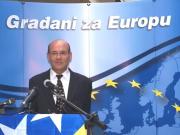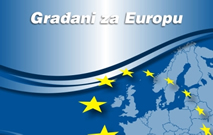''Citizens for Europe''
 The situation in which new government was not formed even five months following the general elections, can no longer be tolerated, said the EU High Representative and the EU Special Representative Valentin Inzko at the presentation of the second phase of „Citizens for Europe“ Initiative in Sarajevo.
The situation in which new government was not formed even five months following the general elections, can no longer be tolerated, said the EU High Representative and the EU Special Representative Valentin Inzko at the presentation of the second phase of „Citizens for Europe“ Initiative in Sarajevo.
He emphasised that this situation shows that either the system does not function or the leadership has made it ineffective. He stated that the problem was caused by those who perfected obstructionism, as well as those who have the possibility to prevent it, but are not doing anything to address the problem. In saying so, he thought of the winning political parties who are most responsible. Still, he did not have the intention, nor will he intend, to get involved in the forming of the government.
Inzko observed that the political show is not the only one, becuse there is an alternative source of solutions to challenges. He thinks that civic initiatives can often lead to better results than those of political parties, but in order for that to happen, citizens must come forward and fill the gap. ˝Political parties will not take the country to Europe if citizens do not encourage them to do so ˝, Inzko said.
The conference was also attended by the Swedish Ambassador to BiH, H.E. Bosse Hedberg, whose government is supporting this initiative financially. He pointed to the many reforms which have not happened yet. ˝It is the responsibility of the newly elected authorities to avoid the standstill compared to countries in the region, and to ensure that citizens benefit from the reform process ˝, Mr Hedberg said.
Director of Vesta Association from Tuzla, Amra Selesković, as the representative of „Citizens for Europe“ network, announced that by September, expert organisations which can contribute to the process of European integrations, will be dealing with the issues of employment, agriculture, rural development, energy efficiency, environment, corruption and other.
Representatives of 15 organisations will have talks with the decision makers, and try to develop recommendations on the priorities in the EU accession process, Fena reported. Three consultative meetings and three public sessions will take place, and Selesković expects clear guidelines to be developed for the action to be taken by government institutions.


